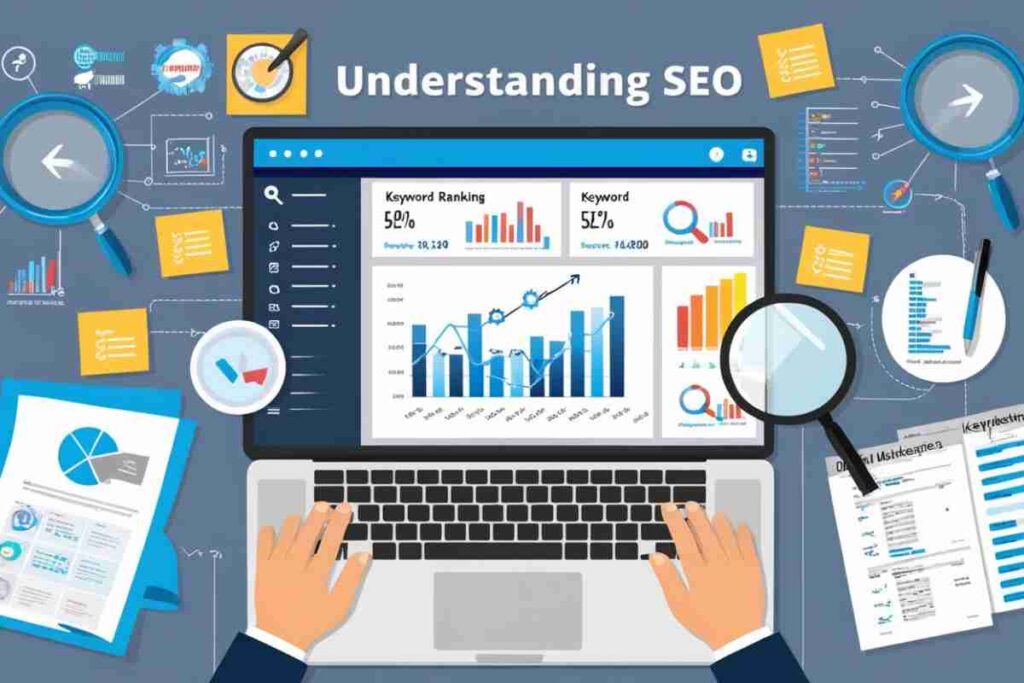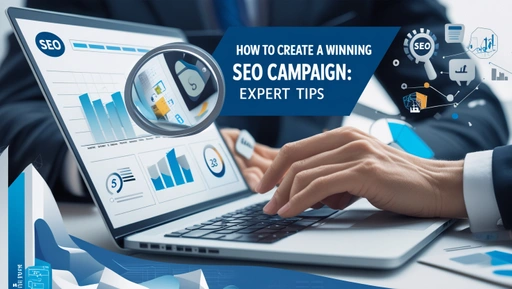In the competitive world of B2B marketing, a strong SEO strategy is crucial to ensuring your business stands out. A well-crafted SEO campaign can increase visibility, attract high-quality leads, and ultimately drive growth.
In this guide, we’ll explore expert tips and proven techniques to help you create a winning B2B SEO campaign that delivers lasting results.
Whether you’re a seasoned marketer or just getting started, these insights will help elevate your SEO efforts and achieve your business goals.
Understanding B2B SEO

To create a winning B2B SEO campaign, you must first understand the unique dynamics of B2B SEO. Business-to-business (B2B) SEO involves optimizing a website for search engines with the goal of attracting other businesses as customers, not individual consumers.
Unlike B2C, where quick conversions might be the focus, B2B SEO strategies revolve around building relationships, generating high-quality leads, and offering solutions that can help businesses improve their operations.
A successful B2B SEO strategy requires a long-term approach, focusing on quality content, solid backlinking, and robust technical SEO.
Why B2B SEO Matters in 2024

In 2024, B2B SEO is more important than ever. Businesses are increasingly turning to search engines to find reliable partners, solutions, and services.
With more and more businesses relying on digital tools and services, implementing a sound SEO strategy has become crucial for standing out in a crowded marketplace. A well-executed SEO strategy can:
- Improve organic visibility
- Increase website traffic
- Generate high-quality leads
- Establish thought leadership in your industry
- Improve conversion rates
Key Elements of a Winning B2B SEO Campaign

Keyword Research and Targeting
The foundation of any successful B2B SEO campaign lies in thorough keyword research, which helps identify high-value, relevant terms that attract the right audience.
By identifying the right seed keywords in SEO—terms and phrases your target audience is searching for—you can tailor your content to meet their needs. When selecting keywords, consider:
- Primary Keywords: These are your main target keywords, typically related to your product or service.
- Long-Tail Keywords: These are more specific phrases that are easier to rank for and can drive high-intent traffic.
- LSI Keywords: Latent Semantic Indexing (LSI) keywords are related terms that help search engines understand the context of your content.
When creating your B2B SEO strategy for 2024, it’s essential to consider both high-volume keywords and niche, highly-targeted long-tail keywords that align with user intent.
Utilize tools like Google Keyword Planner, SEMrush, or Ahrefs to identify keywords with high search volume and low competition.
On-Page SEO Optimization
Once you have a list of targeted keywords, the next step is on-page optimization. This involves optimizing individual pages on your website to rank higher on search engine results pages (SERPs). Some best practices include:
- Title Tags: Ensure your target keywords are included in the title tag of each page. For instance, if you’re targeting “B2B SEO strategy 2024,” make sure it’s included early in the title.
- Meta Descriptions: Write compelling meta descriptions that also include your target keywords, as this can increase your click-through rates.
- Header Tags (H1, H2, H3): Structure your content using header tags to make it easier for both users and search engines to navigate.
- URL Structure: Keep URLs short, relevant, and include your target keyword. For example, “yourdomain.com/b2b-seo-strategy-2024.”
Content Strategy: Creating Valuable Content
Content is at the heart of any SEO campaign, and B2B SEO is no exception. Your content should serve as a valuable resource for businesses looking for solutions. Here’s how to create content that resonates:
- Educational Blog Posts: Write informative blog posts that address common pain points in your industry. For instance, write articles on topics like “How to Optimize Your Website for B2B SEO” or “Top B2B Marketing Strategies for 2024.”
- Case Studies: Showcase how your product or service has helped other businesses succeed.
- Whitepapers and Ebooks: Offer in-depth reports on relevant industry topics to position yourself as a thought leader.
- Infographics: Visual content like infographics can help explain complex concepts and attract more shares.
- Videos: B2B audiences engage with video content. Create how-to videos, webinars, and product demos to connect with potential customers.
The goal is to create content that addresses the specific needs and challenges of your target audience while incorporating your selected keywords.
Link Building for Authority
Building a robust backlink profile is a critical aspect of B2B SEO. Quality backlinks from authoritative sources help search engines view your site as trustworthy and relevant.
Here are a few strategies to gain backlinks:
- Guest Blogging: Write guest posts for reputable websites in your industry and include links back to your site.
- Industry Directories: Get listed in trusted B2B directories.
- Influencer Outreach: Partner with industry influencers to get backlinks from high-authority sites.
- Content Promotion: Promote your content on social media, forums, and other platforms to gain organic backlinks.
Technical SEO for B2B Websites
Technical SEO ensures that search engines can crawl and index your website efficiently. For B2B websites, technical SEO plays a critical role in improving site performance and user experience.
Some important technical SEO elements to focus on include:
- Mobile Optimization: Ensure your site is responsive and optimized for mobile devices. Google uses mobile-first indexing, meaning the mobile version of your website is considered the primary version.
- Site Speed: Slow-loading websites can hurt your rankings and user experience. Use tools like Google PageSpeed Insights to identify and resolve performance issues.
- XML Sitemap: Create and submit an XML sitemap to help search engines understand your site’s structure.
- Secure Website (HTTPS): Security is a top priority for search engines. Make sure your site is secured with HTTPS to build trust with both users and search engines.
Measure and Adjust Your Strategy
An important part of any B2B SEO campaign is tracking your performance and making necessary adjustments.
Tools like Google Analytics, Google Search Console, and SEMrush can help you track key metrics such as:
- Organic traffic
- Keyword rankings
- Bounce rates
- Conversion rates
By consistently monitoring these metrics, you can fine-tune your campaign and improve your B2B SEO strategy over time.
Conclusion
Creating a winning B2B SEO campaign in 2024 requires a comprehensive approach, combining keyword research, content strategy, on-page optimization, link building, and technical SEO.
By focusing on high-value keywords and providing content that addresses the needs of your target audience, you can position your business for long-term success.
By implementing these strategies and continuously measuring your results, you’ll be well on your way to improving your visibility, generating quality leads, and achieving business growth through SEO.
Don’t forget that SEO is an ongoing process. Stay up to date with the latest trends in B2B SEO and B2B marketing to remain competitive in this ever-evolving landscape.
FAQs
What is B2B SEO?
B2B SEO is the process of optimizing your website to attract and convert other businesses through search engines using targeted keywords and strategies.
Why is keyword research important for B2B SEO?
Keyword research helps identify terms your target audience is searching for, allowing you to optimize content to attract relevant leads.
How long does it take to see results from B2B SEO?
It typically takes 3-6 months to see noticeable results from a B2B SEO campaign due to the time needed for indexing and ranking.
Should I focus on long-tail keywords in B2B SEO?
Yes, long-tail keywords are highly valuable in B2B SEO as they target specific search intent and attract qualified leads.
Is content marketing important for B2B SEO?
Absolutely! High-quality, informative content establishes authority and drives traffic, improving both SEO rankings and engagement.
How often should I update my B2B website for SEO?
Regular updates are essential. Aim to refresh content, optimize new keywords, and address technical SEO issues at least once a month.
Can social media impact B2B SEO?
Yes, social media can drive traffic, build brand awareness, and indirectly influence SEO by generating backlinks and engagement.
What role do backlinks play in B2B SEO?
Backlinks from authoritative sites boost credibility and SEO rankings, showing search engines your content is trustworthy and valuable.



